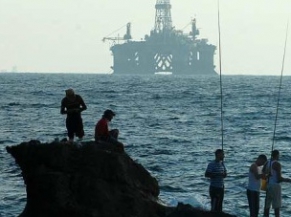|
World Jewish News

Drilling for gass off the coast of Acre Photo by Yaron Kaminsky (Haaretz.com)
|
Infrastructure Minister warns Hezbollah: Israel will fight for its gas fields
24.06.2010 Israel will not hesitate to use force to protect its gas fields from being claimed by Lebanon, Infrastructure Minister Uzi Landau warned this week in an interview with Bloomberg News.
Lebanon parliament speaker Nabih Berri earlier this month urged his government to start exploring its offshore natural gas reserves, claiming that otherwise Israel would claim the resources.
"Israel is racing to make the case a fait accompli and was quick to present itself as an oil emirate, ignoring the fact that, according to the maps, the deposit extends into Lebanese waters," Berri said. "Lebanon must take immediate action to defend its financial, political, economic and sovereign rights.
Hezbollah weighed in soon after Berri submitted a bill to launch exploration of potential offshore reserves, warning Israel not to touch what it called Lebanon's resources.
In response to the warnings, Lebanon told Bloomberg that Israel would "not hesitate to use our force and strength toprotect not only the rule of law but the international maritime law."
"Whatever wefind, they will have something to say," he added. "That's because they're
not challenging our findings and so-called occupation of the sea. Our very existence here is a matter of occupation for them. These areas are within the economic waters of Israel."
Lebanon's former PM and current member of parliament Fouad Siniora also urged the Lebanese government to take the issue of offshore gas reserves in the Lebanese territorial waters very seriously on Saturday, and said he had looked into the matter when he was finance minister and prime minister.
The Lebanese complaints are not new. They arose last year as well with the Dalit and Tamar natural gas discoveries.
The the head of petroleum and natural gas exploration in the National Infrastructures Ministry, Dr. Yaakov Mimran, called the claims "nonsense." He said they were just trial balloons and that the latest offshore discoveries in the Leviathan field, as well as the earlier Tamar and Dalit finds, are absolutely within Israeli territory.
Mimran explained that the Israel-Lebanon border is not perpendicular to the coast and Israel's exclusive offshore economic zone includes all the fields. "Those noises occur when they smell gas. Until then they sit quietly and let the other side spend the money," he added.
Senior Israeli officials said it was Lebanon that set the limits on its own territorial waters after it had given out exploration licenses exactly along these borders. "What are they complaining about now?" asked one official. "That is how Cyprus acted, which set the border of its exclusive economic zone between countries at a distance of 200 kilometers from Israeli shores and sold the [licenses] for exploration to private entrepreneurs along this line," said an official.
Israel still has yet to declare its exclusive economic zone, though this usually applies to what is in the sea, such as fish, and not what lies under the continental shelf. Problems may arise when the continental shelf is shared by more than one country, such as can occur in the Mediterranean, explains Prof. Moshe Hirsch of the Hebrew University in Jerusalem, an expert in international law. He said the gas is under Israel's continental shelf, so there was no need to declare an exclusive economic zone.
When one country's continental shelf is within the 200-kilometer zone of another nation, the countries must agree to the boundaries, he said.
Haaretz.com
|
|
